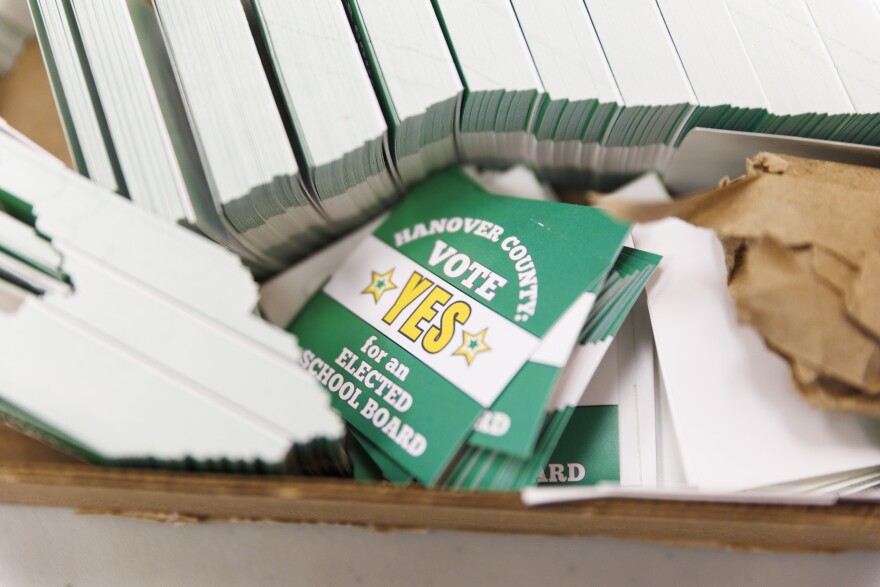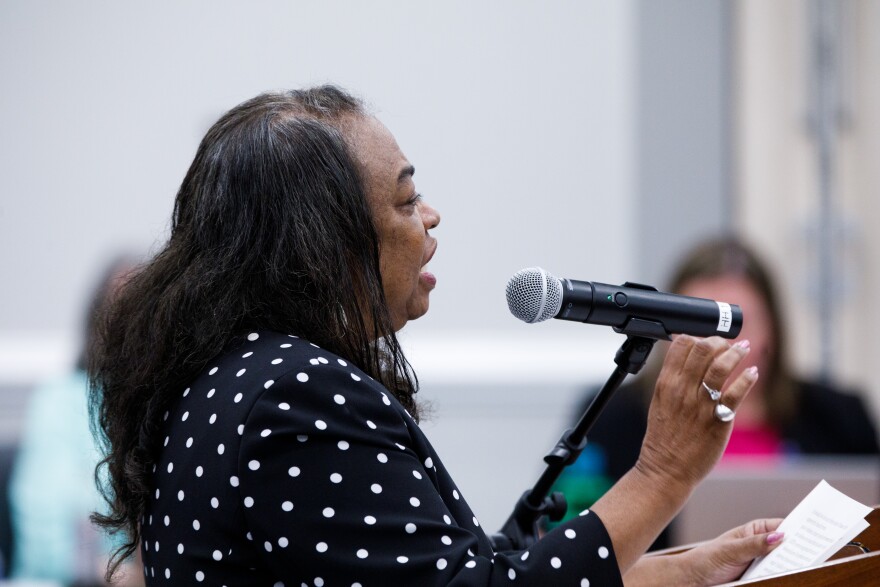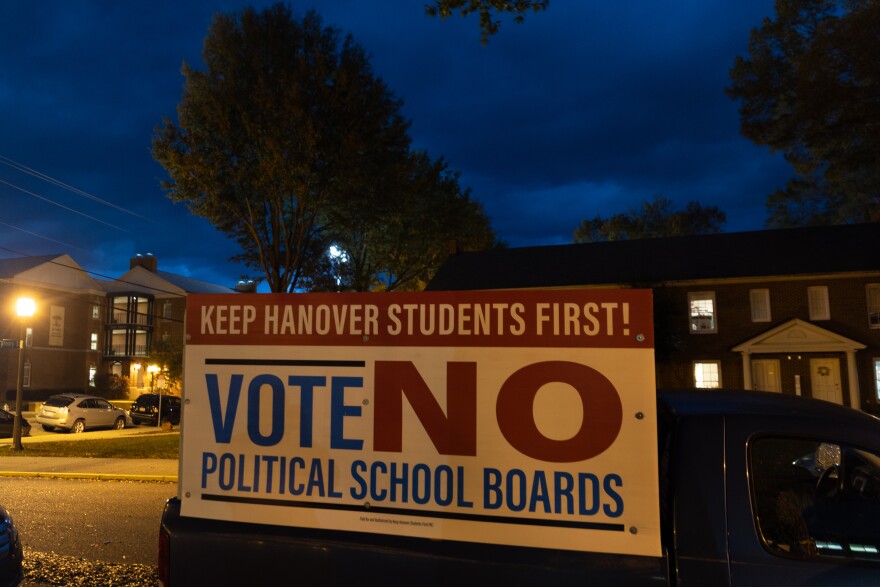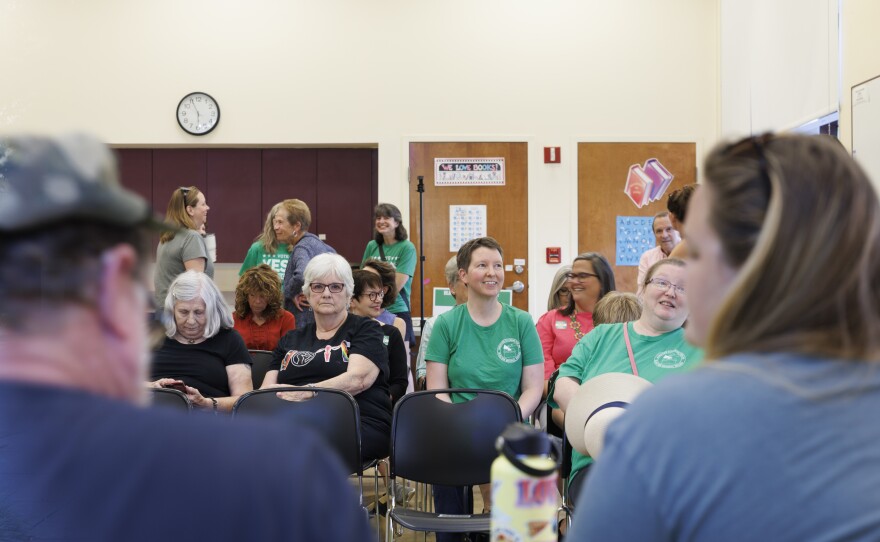There are 17 state and local offices on the ballot this Election Day in Hanover County, but the campaign that divides many voters is the question at the bottom of the page.
“Shall the method of selecting the school board be changed from appointment by the governing body to direct election by the voters?”
Currently representatives on the seven-member board are appointed by the county’s Board of Supervisors. If passed, the referendum would allow elections for each school board seat.
This ballot measure was added in late July, after a grassroots coalition of about 90 volunteers gathered over 10,000 signatures from registered voters in the county. The Hanover Citizens for an Elected School Board started its campaign in late 2022, after failing to gather enough signatures the previous election cycle.
Kim Cately, a mother from the Ashland District, told VPM News she started volunteering for the group shortly after signing the petition.
“I was a petition collector, which is very much outside of my comfort zone,” Cately said. “I work in communications professionally so I've been helping with the website and a little bit with social media and things like that. We all just take what we know from our own lives and try to run this campaign together.”
Cately, like many parents in Hanover, became more politically active after the seven-person school board began discussing controversial topics such as removing books from school libraries and the civil rights of transgender students.
Cately learned that Hanover County remains one of the few Virginia localities in which school board members are appointed by the county’s local governing body, the board of supervisors, rather than elected.

“When I found out they were appointed I was surprised. I didn’t really understand what that meant,” she said. “I thought, ‘Why wouldn't they be elected like in most places that I've lived in?’”
Virginia has a long, sordid history with appointed school boards that stems from Jim Crow-era policies of the early to mid 20th century. It wasn’t until 1947 that the Virginia General Assembly passed a law permitting Arlington County to elect its school board.
When the U.S. Supreme Court ended school segregation in 1954 following its decision in Brown v. Board of Education, Arlington was the first locality to integrate its school system . The General Assembly then repealed the law permitting school board elections.
Historian James Hershman, a professor emeritus at Georgetown University, previously told VPM News this was a retaliatory gesture in response to integration.
After multiple legal battles spurred by groups like the ACLU and NAACP, the General Assembly finally permitted all Virginia localities to petition for school board elections beginning in 1992, where most localities did. Today, only 12 of 132 school boards are still appointed, according to the Virginia School Board Association.
In 2009, Kent Wilis, then-executivedirector of the ACLU of Virginia, described appointed school boards as “part of the legacy of Virginia's Post-Reconstruction period, during which the state’s white leaders sought to limit the political influence of African-Americans.”
“Although we [Virginians] like to talk a lot about democracy, our government made it so certain groups of people weren’t able to vote,” Hershman said. “That’s historically true, especially in rural counties.”
Patricia Hunter-Jordan, president of the Hanover NAACP, told VPM News those historic barriers are part of why she’s voting yes to an elected school board.

“What we want is democracy in Hanover County,” Hunter-Jordan said. “Democracy looks like an elected school board, because that is our right. If we have an elected school board, we have a say in who represents us. Currently, we do not have a say.”
Hunter-Jordan said an elected board would only enhance the quality of education in Hanover, adding that an elected body’s interests would be more aligned with the will of its constituents rather than the people who appoint them.
She said an election could also help level the playing field for more diverse and lesser known candidates who are sometimes passed over by the board of supervisors during a rushed interview process.
“If you are elected, then you have to do what is in the best interest of the people in your community. And that is what we're looking for,” Hunter-Jordan said. “Someone who will actually listen to what we want. We want representation. We want equity, we want the same things that everyone else has.”
Recently, more parents, teachers and students have spoken up against the appointed school board’s direction, but resident Karen Reardon, a parent in the Chickahominy District, says she’s still voting no to an elected school board, to keep politics out of her children's classrooms.
“Hanover is just like every other county, there are things that could be better,” Reardon told VPM News. “There are always things that can be better.”
Reardon was one of the attendees at another event hosted by the Hanover Citizens for an Elected School Board. She pushed back against a panel of education professionals who supported an elected board.
Sterling Daniel, a former Hanover school board member who represented the Mechanicsville District, told VPM News the divide between the board and its constituents is far from abnormal.
He pointed to controversial and important decisions made by Daniel and his colleagues during the onset of the COVID-19 pandemic over mask wearing and maintaining in-person instruction before vaccines were widely available.

“Politics has always been in school divisions; it has always been in school boards,” Daniel said. “When you’re a public servant you can’t please everyone.
Daniel was one of several speakers who attended a rally hosted by the Hanover Citizens for an Elected School Board at the Ashland Library in support of having an elected school board.
Daniel addressed residents’ concerns that taking school board selections to voters would make the county’s school system too political.
“Our school board is already appointed by folks in elected office. What I question is why people wouldn’t vote for their representative themselves,” he said.
But Reardon disagrees, saying an elected board is “often beholden to other political interests.” She said elections often lead to outside groups campaigning and out-financing; a political arms race for control.
Shortly after the referendum was added to the ballot, Keep Hanover Students First began its own campaign in opposition to an elected school board and significantly outraised and outspent the Hanover Citizens for an Elected School Board.

According to finance records from the Virginia Public Access Project, Hanover Citizens for an Elected School Board raised just over $10,000 this election cycle, while Keep Hanover Students First raised over $50,000 with the Hanover Republican Committee as the group’s campaign's top donor.
Danielle Geist, another parent from Ashland and volunteer with the Hanover Citizens for an Elected School Board, said the committee's spending shows its resistance to change.
"I know our county is deeply conservative and those people are deeply rooted here, they think they know what's best," Geist said. "I just don't think that is what the future of Hanover is. I think they feel the changes coming which is probably the reason for throwing so much money in.”
For Reardon, an election won't solve the problem of Hanover residents being deeply divided over how to protect and educate their children.
“I think we're all coming from the same place and that we want what's best for our kids,” Reardon said. “I am missing what about an elected school board will change any of the things that need to be changed.”
But the NAACP’s Hunter-Jordan said just having the choice in the hands of the voters is a step in the right direction.
“Why would you not want to vote for someone to represent you,” Hunter-Jordan said. “I can't see an answer to that. I do not understand why anyone would say no.”



